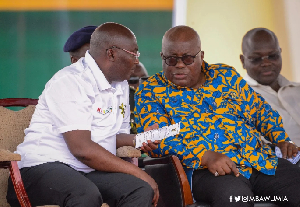Rating agency Standard & Poor’s has affirmed its controversial ‘B/B’ ratings on Ghana’s creditworthiness, arguing that the country’s stable politics and strong GDP growth are offset by its continued weak fiscal management.
S&P’s announcement comes as Finance Minister Dr. Kwabena Duffuor prepares to present next year’s budget to Parliament, which will reveal the extent of fiscal consolidation in 2011 and point to the outlook for 2012.
“We are affirming our ‘B/B’ foreign- and local-currency sovereign credit ratings on Ghana. The stable outlook balances our view of the country’s strong growth prospects and track-record of political stability against its weak payment culture and fiscal challenges,” said S&P in a statement.
Ghana’s oil-fuelled double-digit economic growth for 2011 has been all but confirmed by official GDP data on the first two quarters of the year. Output grew by 23 and 16.4 percent year-on-year in the first and second quarters respectively.
Based on this performance, the Ghana Statistical Service has projected end-year growth of 13.6 percent, with oil production powering industry to 36.2 percent growth. Expansion in agriculture and services will however slow to 4.2 and 2.8 percent respectively.
The macro-picture has become increasingly stable, with inflation staying in single digits for 16 consecutive months since June 2010. The cost of government borrowing has eased, and the fiscal and current account deficits have fallen below the high levels they reached in 2008.
But despite this progress, fiscal targets have been missed and the deficit in 2010 widened more than expected -- with a hangover of payment arrears owed to contractors and suppliers.
“In our view, the government’s weak payment culture and fiscal discipline continues to be highlighted by the net new accumulation in 2010 of further arrears amounting to 1.9 percent of GDP, raising the stock of arrears to an estimated 5.5 percent of GDP at year-end 2010. In addition, the fiscal deficit widened to 7.4 percent of GDP in 2010, from 6 percent in 2009,” S&P said.
It cited its concern about the government’s decision to direct higher-than-expected 2011 revenues toward increased spending instead of aiming for a quicker reduction of the fiscal deficit or arrears. Duffuor’s supplementary budget presented in July raised the planned fiscal deficit to 5.1 percent of GDP, from an initial target of 4.1 percent.
S&P said it expects the 2011 fiscal deficit to exceed the budget plan and reach 6 percent of GDP. This appears to be consistent with the Economist Intelligence Unit’s (EIU) deficit forecast of 5.9 percent of GDP. In a report published this month, the EIU said its analysis of Bank of Ghana data showed the execution of the 2011 budget “looks to be off-track”, with government spending still pacing rapidly.
But Duffuor said last month that he expected a lower-than-planned deficit figure because some spending would be held back due to lower grant receipts.
Another fiscal threat, according to the rating agency, relates to the extent of contingent liabilities that could crystallise from state-owned enterprises (SOEs) and the banking sector. Between 2009 -2011, the government paid off a substantial portion of arrears owed by the Tema Oil Refinery (TOR) to Ghana Commercial Bank and other creditors in the banking sector.
When the government borrowed from the International Monetary Fund (IMF) in 2009 to shore-up its foreign reserves, it agreed to streamline the operations of SOEs by among others ensuring market-based pricing of energy products and utility services.
Some effort has been seen but pump prices continue to be subsidised, this time through a hedge for oil imports. Nevertheless, this policy has received support from creditors because of the stability it introduces to public finances.
S&P recognised the progress achieved in building a legislative framework for the management of oil revenues, a weakness it identified when it downgraded Ghana’s rating from B+ to B in August last year.
“The Petroleum Revenue Management Bill, passed in 2011, has added clarity to government oil receipts. Receipts from the oil sector should begin to improve fiscal flexibility in the medium-term, provided that spending can be contained.”
It echoed a caution most watchers of the economy have been sounding in recent months, warning of the risk of fiscal dislocation as elections approach in 2012.
“In our view looming elections could further erode fiscal discipline, with forthcoming oil revenues possibly used as an excuse to ramp-up spending even more. Pressure on government spending is heightened by intense popular demand to improve public services, and by spending pressures associated with the 2012 presidential elections that are, once again, likely to be close.”
The public debt looks set to rise further with the signing of a bilateral loan from China, which is intended for oil projects and infrastructural upgrades in the Western Region and other areas. S&P noted that the debt-burden as currently assessed excludes domestic expenditure arrears and public-sector contingent liabilities.
The agency’s transfer and convertibility (T&C) assessment was kept one notch (B+) above the foreign-currency sovereign rating, reflecting the opinion that the likelihood of non-sovereign debt issuers in Ghana defaulting on their foreign-exchange obligations is slightly less than the risk of the state itself defaulting.
It would take prudent use of oil income, continued reductions in the fiscal and external deficits, and the payment of arrears to support a higher rating level in the future, S&P said. Deterioration in the fiscal situation and failure to liquidate arrears could, however, pull the ratings downward.
Business News of Wednesday, 9 November 2011
Source: BFT
















